
The 1964 Winter Olympics, officially known as the IX Olympic Winter Games and commonly known as Innsbruck 1964, was a winter multi-sport event which was celebrated in Innsbruck, Austria, from January 29 to February 9, 1964. The city was already an Olympic candidate, unsuccessfully bidding to host the 1960 Games. Innsbruck won the 1964 Games bid, defeating the cities of Calgary in Canada and Lahti in Finland. The sports venues, many of which were built for the Games, were located within a radius of 20 km (12 mi) around Innsbruck. The Games included 1,091 athletes from 36 nations, which was a record for the Winter Games at the time. Athletes participated in six sports and ten disciplines which bring together a total of thirty-four official events, seven more than the 1960 Winter Olympic Games. The luge made its debut on the Olympic program. Three Asian nations made their Winter Games debut: North Korea, India and Mongolia.
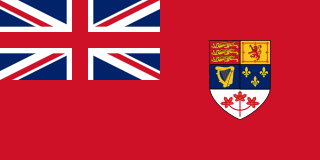
Canada competed at the 1964 Winter Olympics in Innsbruck, Austria. Canada has competed at every Winter Olympic Games.

Alpine skiing has been contested at every Winter Olympics since 1936, when a combined event was held in Garmisch-Partenkirchen, Germany.

Luge is a winter sport featured at the Winter Olympic Games where a competitor or two-person team rides a flat sled while lying supine and feet first. The sport is usually contested on a specially designed ice track that allows gravity to increase the sled's speed. The winner normally completes the route with the fastest overall time. It was first contested at the 1964 Winter Olympics, with both men's and women's events and a doubles event. Doubles is technically considered an open event since 1994, but only men have competed in it. German lugers have dominated the competition, winning 87 medals of 153 possible.

The Soviet Union (USSR) competed at the 1964 Winter Olympics in Innsbruck, Austria.

France competed at the 1964 Winter Olympics in Innsbruck, Austria.

Austria was the host nation of the 1964 Winter Olympics in Innsbruck.

Switzerland competed at the 1964 Winter Olympics in Innsbruck, Austria.

Hungary competed at the 1964 Winter Olympics in Innsbruck, Austria.

Athletes from the Socialist Federal Republic of Yugoslavia competed at the 1964 Winter Olympics in Innsbruck, Austria. Yugoslavia returned to the Winter Olympic Games after having missed the 1960 Winter Olympics.

Belgium competed at the 1964 Winter Olympics in Innsbruck, Austria, returning to the Winter Games after missing the 1960 Winter Olympics.

Argentina competed at the 1964 Winter Olympics in Innsbruck, Austria.

South Korea, as Republic of Korea, competed at the 1964 Winter Olympics in Innsbruck, Austria.
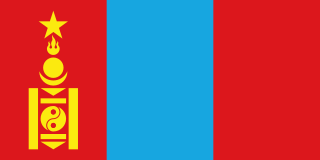
Mongolia competed in the Winter Olympic Games for the first time at the 1964 Winter Olympics in Innsbruck, Austria.
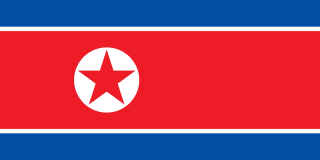
North Korea competed as North Korea at the 1964 Winter Olympics in Innsbruck, Austria. It was the first time that the nation was represented at any Olympic Games. Han Pil-hwa is the first Winter Olympic medalist from either Korea before South Korea won its first winter medals in 1992 starting with Kim Ki-hoon.
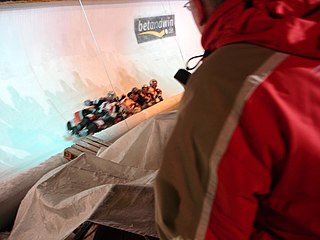
The Olympic Sliding Centre Innsbruck is a venue for bobsleigh, luge and skeleton located in Igls, Austria. The most recent version of the track was completed in 1975 and is the first permanent, combination artificially refrigerated bobsleigh, luge, and skeleton track, serving as a model for other tracks of its kind worldwide. It hosted the bobsleigh, luge, and skeleton competitions for the 2012 Winter Youth Olympics.

The Republic of the Congo, competing as Congo, first participated at the Olympic Games in 1964, and has sent athletes to compete in most Summer Olympic Games since then. Congo missed the 1968 Games and boycotted the 1976 Games along with most other African nations. Congo has never participated in the Winter Olympic Games.
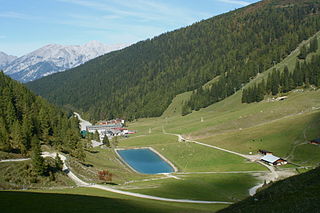
Axamer Lizum is a village and ski resort in Austria, located southwest of Innsbruck in the state of Tyrol. At the 1964 Winter Olympics, it hosted five of the six alpine skiing events: women's downhill, and men's and women's slalom and giant slalom. Men's downhill was held at Patscherkofel. Twelve years later in 1976, it hosted exactly the same alpine skiing events.
For the 1968 Winter Olympics in Grenoble, France, a total of ten sports venues were used. Most venues were constructed between the 1964 Winter Games in Innsbruck and the 1968 Games. Thawing was an issue for the four-man bobsleigh run. They were limited to only two runs. Thawing also affected the men's 500 m speed skating event. Electronic timing in alpine skiing affected the results of the women's giant slalom event. It gave Canada's Nancy Greene a headache for two days despite her gold medal in the event.


















